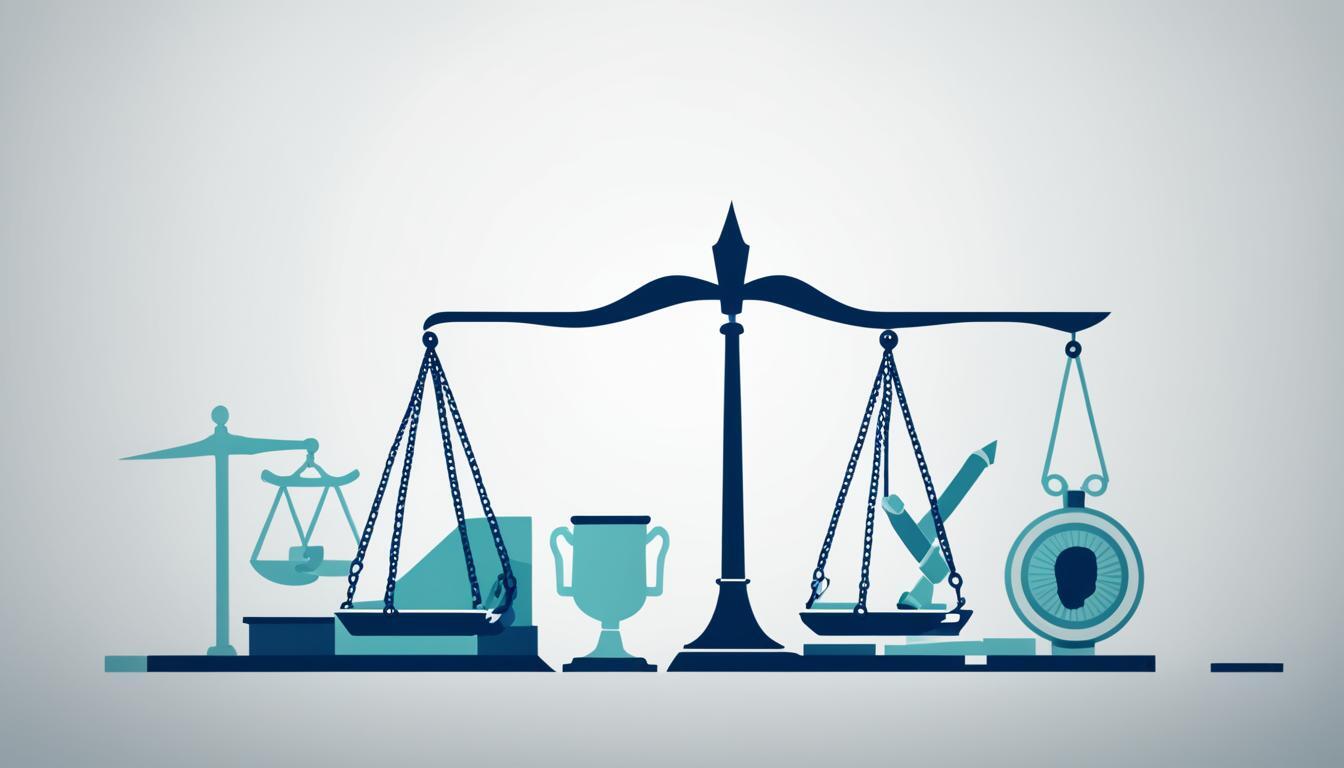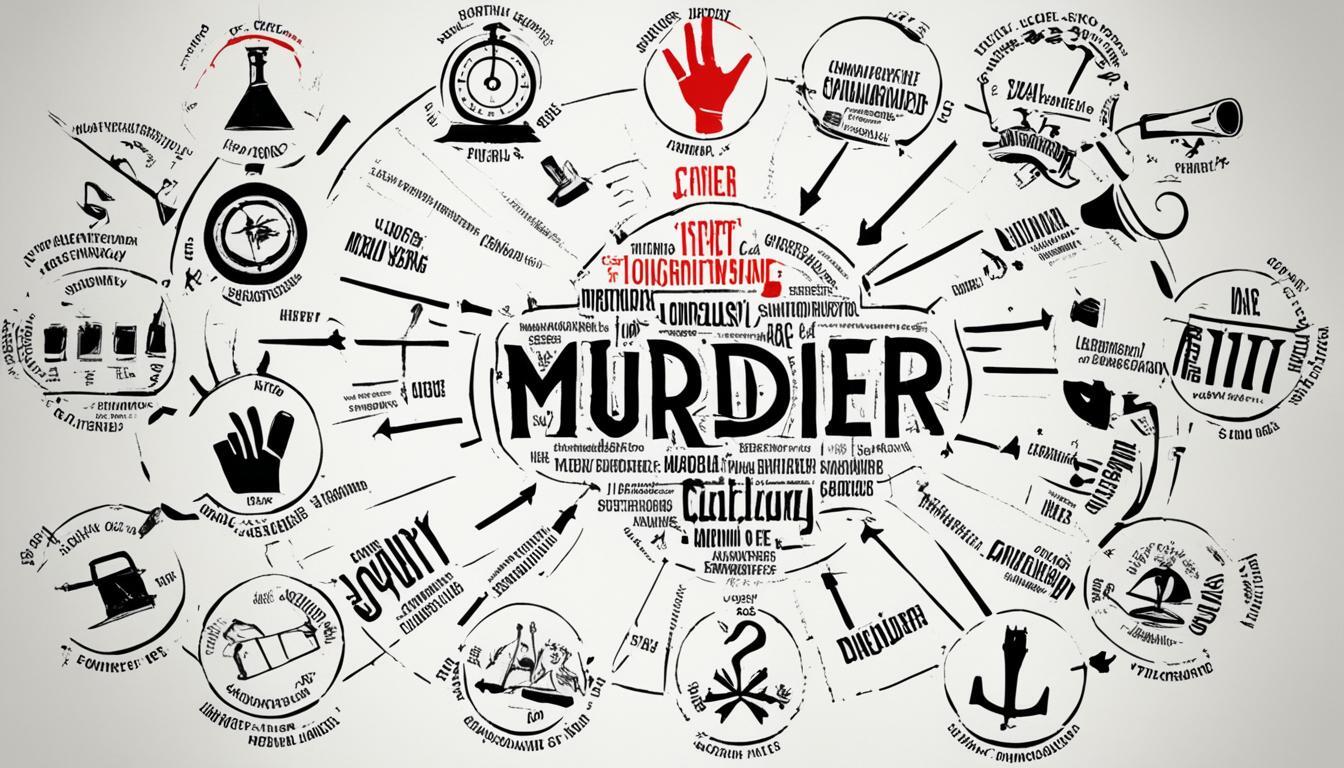Exploring Types of Criminal Crimes | A Guide
Did you know that there are three types of criminal offences in Canada? These offences encompass a wide range of unlawful acts, illegal conduct, and criminal law violations that can have serious consequences. Understanding the different types of criminal crimes is essential for navigating the Canadian legal system and ensuring compliance with the law.
Key Takeaways:
- There are three types of criminal offences in Canada: indictable, summary, and hybrid offences.
- Indictable offences are the most serious and can include murder, human trafficking, and robbery, with penalties ranging from life imprisonment to fines.
- Summary offences are considered minor and include charges like trespassing and causing a disturbance, with a limitation period of 12 months.
- Hybrid offences allow the Crown to choose whether to proceed summarily or by indictment and include crimes like breach of probation and possession of a controlled substance.
- Understanding the types of criminal crimes is crucial for individuals to know their rights and navigate the legal system effectively.
Understanding Cyber Crimes in Canada
Cyber crimes in Canada encompass a range of illegal activities carried out through computers and the internet. These crimes pose significant threats to individuals, organizations, and the overall security of the digital landscape. It is crucial to understand the nature of cyber crimes and the potential risks they pose.
Various forms of cyber crimes exist, including:
- Computer hacking: This involves unauthorized access to computer systems, networks, or devices, often with malicious intent.
- Identity theft: Cyber criminals steal personal information, such as social insurance numbers or bank account details, to commit fraud or other criminal activities.
- Fraud: Online scams and deceptive practices aimed at obtaining financial gain from unsuspecting victims fall under this category.
- Online predation: Criminals target vulnerable individuals, particularly children, using the internet to exploit, manipulate, or harm them.
- Ransomware: This is a type of malicious software that encrypts a victim’s data, rendering it inaccessible until a ransom is paid.
The rise of the internet and advancements in technology have facilitated the proliferation of cyber crimes. One crucial aspect of cyber crimes is their global reach. Perpetrators can carry out illegal activities from anywhere in the world, making it challenging for law enforcement agencies to trace and prosecute offenders.
A 2020 report by the World Economic Forum estimated that cyber crimes could cost the global economy up to $6 trillion annually by 2021, underscoring the wide-ranging impact of these crimes on individuals, businesses, and governments.
It is essential for individuals and organizations to remain vigilant and take appropriate measures to protect themselves against cyber threats. This includes employing robust cybersecurity measures, such as using strong passwords, regularly updating software, and being cautious of suspicious emails or websites.

By understanding cyber crimes and the tactics used by cyber criminals, individuals and organizations can better safeguard their digital presence and contribute to creating a more secure online environment. Stay informed, stay protected!
Exploring White-collar Crimes in Canada
White-collar crimes encompass a range of unlawful activities committed by individuals in professional or high-ranking positions. These crimes primarily focus on financial matters, property, and fraud. Some common examples of white-collar crimes include embezzlement, bank fraud, healthcare fraud, money laundering, mortgage fraud, and intellectual property theft.
Embezzlement involves the misappropriation of funds entrusted to a person, typically an employee, for personal gain. Bank fraud refers to fraudulent activities committed against financial institutions, such as forging signatures, creating false identities, or manipulating financial records.
Healthcare fraud involves submitting false claims, engaging in kickback schemes, or providing unnecessary medical services for financial gain. Money laundering is the process of disguising the origins of ill-gotten funds to make them appear legitimate. Mortgage fraud, on the other hand, entails fraudulent activities in the mortgage application process, such as providing false information or inflating property values.
Intellectual property theft, also known as copyright infringement or piracy, involves the unauthorized use, reproduction, or distribution of someone else’s intellectual property, such as patents, trademarks, or copyrighted materials.
To combat white-collar crimes, law enforcement agencies such as the Federal Bureau of Investigation (FBI) in Canada conduct investigations and prosecute individuals involved in these financial crimes. The FBI utilizes various programs and strategies, including asset forfeiture to freeze accounts and seize ill-gotten gains, as well as the Racketeer Influenced and Corrupt Organizations (RICO) laws to dismantle organized criminal ventures.
White-collar crimes have significant consequences, causing financial losses to individuals, businesses, and the economy as a whole. These crimes undermine trust and integrity in the corporate and financial sectors, impacting stakeholders and society at large.

White-collar crimes require the attention and vigilance of both law enforcement agencies and individuals to prevent and combat these illegal activities. By raising awareness, implementing stronger regulations, and fostering ethical practices, we can work toward a more transparent and trustworthy business environment.
Understanding Organized Crimes in Canada
Organized crime is a pervasive issue that has far-reaching consequences for societies around the world, and Canada is not immune to its effects. Organized crime syndicates operate both nationally and internationally, engaging in a wide range of illegal activities that include bribery, human trafficking, and robbery. These criminal networks exacerbate economic instability, foster violence, and pose significant threats to public safety.
One of the challenges in combatting organized crime is the ability of these syndicates to conceal their activities and maintain a global reach. As a result, it becomes increasingly difficult for authorities to dismantle their criminal networks and hold individuals accountable for their actions. Recognizing the gravity of the situation, law enforcement agencies, such as the FBI, respond to the threats posed by national and transnational organized crime groups.
The FBI employs various strategies to combat organized crime, including the use of programs like the Racketeer Influenced and Corrupt Organizations Act (RICO). RICO enables law enforcement agencies to target individuals involved in racketeering and other organized criminal activities, allowing for the disruption and dismantling of these criminal enterprises.
Organized crimes pose a significant threat to society, undermining economic stability and compromising public safety. By understanding the intricacies of these criminal networks and employing effective measures like RICO, authorities can take crucial steps towards mitigating organized crime’s detrimental effects and protecting communities.
Exploring Violent Crimes in Canada
I have always been fascinated by the study of criminal behavior and its impact on society. In this section, we will delve into the world of violent crimes in Canada and examine the key aspects of these criminal activities.
Violent crime rates in Canada have shown a gradual decline over the years, thanks to the efforts of law enforcement agencies and the implementation of effective crime prevention strategies.
When we talk about violent crimes, the first things that come to mind are murder, rape, robbery, and assault. These crimes are considered the most heinous and pose a serious threat to public safety.
The FBI plays a crucial role in tracking and investigating violent crimes in Canada, working in collaboration with local law enforcement agencies. Their primary objective is to apprehend the perpetrators and bring them to justice.
Let’s take a closer look at some of the specific types of violent crimes:
- Murder: The intentional killing of another person is classified as murder. It is a grave offense with severe penalties, including life imprisonment.
- Rape: This encompasses a wide range of nonconsensual sexual acts, including sexual assault and sexual violence. Rape is a traumatic experience for victims, and efforts to combat this crime are of utmost importance.
- Robbery: Robbery involves the use of force or the threat of violence to steal property from another person. It is a crime that combines violence and theft, often instilling fear and intimidation in the victim.
- Assault: Assault refers to the intentional act of causing physical harm or injury to another person. It can range from simple assault to aggravated assault, depending on the severity of the harm caused.
The efforts to combat violent crimes have contributed to a decrease in crime rates across the country. However, it is important to remain vigilant and continue working towards creating a safer society for everyone.
The Impact of Violent Crimes
Violent crimes have far-reaching consequences, not only for the victims but also for their families and communities. They leave a lasting impact on individuals, often causing physical and psychological trauma.
Communities affected by violent crimes may experience a sense of fear and insecurity, which can have long-term social and economic implications. It is crucial to address the root causes of violent behavior and implement measures to prevent future occurrences.
Understanding Regulatory Requirements in Canada
As individuals and organizations in Canada, it is crucial to abide by the regulatory requirements set forth by the legal system. Compliance with these regulations ensures the smooth operation of businesses and promotes a safe and fair environment for all. Understanding the regulatory landscape and its implications is essential for maintaining a strong position within the criminal law framework.
Canadian businesses are subject to various regulatory requirements across different sectors. These requirements encompass areas such as occupational health and safety, environment, privacy, securities, and competition. Each sector has its own set of rules and guidelines that businesses must comply with to avoid legal consequences.
To comply with regulatory requirements effectively, individuals and organizations need to have a strong understanding of the legal system. Familiarity with the criminal law and its intricacies provides clarity on the standards expected from businesses and helps develop strategies to ensure compliance.
Law societies play a vital role in regulating the legal profession in Canada. In each province or territory, there is a designated law society responsible for overseeing the work of lawyers and paralegals. These societies establish and enforce professional standards, ensuring the integrity and competence of legal professionals. They play a crucial role in maintaining the reputation of the legal system and promoting public trust.
| Regulatory Requirements | Sector |
|---|---|
| Occupational Health and Safety Regulations | Workplace safety |
| Environmental Protection Regulations | Environmental sustainability |
| Privacy Regulations | Data protection and privacy |
| Securities Regulations | Financial markets and investments |
| Competition Regulations | Market competition and antitrust |
By adhering to the regulatory requirements and legal standards, businesses demonstrate their commitment to ethical practices and social responsibility. This not only helps protect the interests of stakeholders but also fosters trust among customers, investors, and the wider community.
Compliance with regulatory requirements can be complex and challenging. Seeking legal advice and guidance is crucial to navigate the intricacies of the legal system effectively. Criminal defense lawyers with a deep understanding of regulatory requirements and the criminal law framework can provide valuable insights and ensure businesses maintain compliance while minimizing legal risks.
Stay Compliant and Thrive
Understanding and adhering to regulatory requirements is not only a legal obligation but also a path to success in the Canadian business landscape. By staying compliant with the law and maintaining ethical practices, businesses can build a strong foundation, gain a competitive edge, and contribute to the overall integrity and stability of the legal system.
Defending Against Criminal Charges in Canada
When facing criminal charges in Canada, it is crucial to have proper legal representation to navigate the complex legal process. Hiring a skilled criminal defense lawyer can significantly impact the outcome of your case, ensuring that your rights are protected and that you receive a fair trial.
The legal system in Canada is designed to provide every individual with the opportunity to defend themselves against criminal charges. Understanding the role and function of the courts is essential in preparing a strong defense. The courts play a vital role in ensuring a fair trial and upholding the principles of justice.
Throughout the legal process, there are different stages that your case may go through, including arraignment, plea negotiation, trial preparation, trial, and, if necessary, appeal. Each stage requires careful attention to detail and a comprehensive understanding of the legal procedures and strategies.
Having proper legal representation provides you with valuable resources to strengthen your defense. A knowledgeable criminal defense lawyer will thoroughly investigate your case, gather evidence, interview witnesses, and develop a persuasive defense strategy. They will advocate for your rights, challenge the prosecution’s evidence, and present compelling arguments to protect your innocence or mitigate the charges against you.
With the potential consequences of criminal charges, such as imprisonment, fines, and damage to your reputation, it is crucial to have a skilled legal professional guiding you through your case. A qualified criminal defense lawyer will provide you with peace of mind, knowing that your interests are being represented, and will work tirelessly to achieve the best possible outcome for your situation.
A strong defense requires a strategic approach, thorough understanding of the legal system, and effective advocacy. If you are facing criminal charges in Canada, consulting with a criminal defense lawyer is the first step towards protecting your rights, ensuring fair treatment, and securing the best possible outcome for your case.
Resources and Articles on Criminal Law in Canada
If you’re seeking more information on criminal law in Canada, you’ve come to the right place. Whether you are a concerned citizen or facing legal issues, accessing reliable resources is essential for understanding and navigating the complexities of the Canadian legal system.
A valuable resource to explore is the Criminal Law Blog, where experienced criminal lawyers share their insights and expertise. The blog covers a wide range of topics, such as criminal defense strategies, court procedures, and recent legal developments. By reading these informative articles, you can gain valuable knowledge and guidance on various aspects of criminal law.
Additionally, if you require legal assistance, you can utilize the criminal lawyer directory available. This directory provides a comprehensive list of trusted legal professionals specializing in criminal law. From defense attorneys to prosecutors, you can easily find the right legal representation to address your specific needs.
Whether you’re looking for legal articles to expand your knowledge or need help finding a criminal lawyer, these resources are designed to empower individuals like you in navigating the field of criminal law in Canada. Stay informed, make informed decisions, and protect your rights with the help of these valuable tools.
- Quebec Police Officer Salary Insights 2023 - July 13, 2025
- Canada Arrest Protocol: What Police Say Upon Arrest - June 12, 2025
- Can Police Disclose Who Reported You? Find Out Here - June 6, 2025




















Post Comment